by Hanna Roberts | Feb 1, 2019 | Academics, COBA Events, COBA Faculty, COBA Staff, Current Students, Faith Infusion, Special Speakers
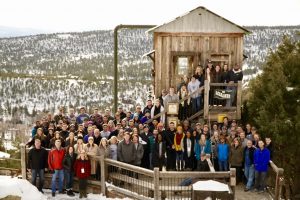
The 2019 Leadership Summit group.
In January, over seventy students traveled to the top of a mountain in Colorado and spent a week learning about leadership from thirteen speaker sessions and a team of faculty and staff from ACU. Through the dynamic speakers, practical application of what is taught, and spiritual insight, students are equipped for leadership in the family, in their community, in the church, and in the marketplace. This short course is one of the most transformational experiential learning opportunities COBA offers and is always a favorite for students that attend.
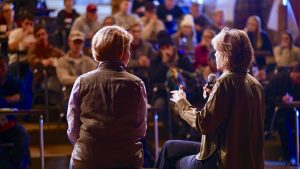
Wendy Davidson and Elise Mitchell speak to students.
A unique aspect of Leadership Summit is an opportunity for students to hear from CEO’s, inspiring speakers, and ACU faculty and staff and get to know these individuals on a personal level. “One of the speakers shared a really impactful story about facing significant troubles in the workplace as a direct result of sharing his faith,” said Lincoln Jones, a senior accounting and IS major. “His testimony encouraged me to not fear the backlash from bringing faith into the workplace.” Some of the speakers from this year include Brad Gautney, founder and president of Global Health Innovations, Rick Atchley, preaching minister at The Hills, Wendy Davidson, president of U.S. Specialty Channels Kellogg Company, Tim Goeglein, senior advisor to the president and vice president for External Relations at Focus on the Family and deputy director of the White House Office of Public Liaison from 2001-2008 for President George W. Bush, Carlos Sepulveda, chairman of Triumph Bancorp, Inc. and former president and CEO of Interstate Batteries, Mike Willoughby, CEO of PFSweb, Inc., Elise Mitchell, founder and chair of Mitchell Communications and CEO of Dentsu Aegis PR Network, and Pete and Austin Ochs, founder/chairman and CEO, respectively, of Capital III.
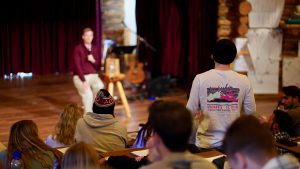
Students have the chance to ask speakers questions at the end of each session.
In addition to lecture sessions, students are able to spend time talking with speakers one-on-one and share meals with them. Some of the speakers serve as mentors for a ‘River Crossing’ project, a project that challenges students to make a plan to use their given leadership positions to make a difference in the world. Taylor Gould, a junior marketing major, said that her favorite part of the experience “was simply being in Colorado and feeling connected with my professors, classmates, and the speakers. It was amazing to be able to experience all of it with people who you would never meet otherwise and people you see every day. The lessons from the week were very applicable and made me feel so inspired.” A community connection is at the core of Leadership Summit and happens at many different levels between every person – speaker or student – in attendance.

Zach Smith, Hill Holloway, and Hayden Hood swing off the side of the mountain on ‘The Screamer.’
While the week offers many moments for educational, spiritual, and community-centric transformation, the location also allows students to have a lot of fun. The class is currently held at Frontier Ranch, a YoungLife camp outside of Buena Vista, Colorado and YoungLife staff serve the Summit attendees throughout the week. Students can hike up to the crosses at the top of a mountain peak, swing off the side of a mountain on the Screamer, play archery tag, and spend time building community and fellowship in the game room. These experiences give students the chance to spend time with each other and grow in deeper connection (and also face their fears, especially if they have a fear of heights).
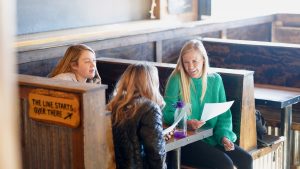
Students spend time in community with each other throughout the week.
Every year, students return to Abilene refreshed and challenged to make a difference in their communities and this year was no different. Mariel Delgado, a senior architecture and interior design major, shared that Summit “is not like any other business class you will ever take and the lessons you learn and friendships you make are unlike any other. Hearing everyone’s life stories from such a raw perspective but also just the fact that so many people took the time to come speak to us and pour into our lives for that week.” We look forward to watching how Mariel and all of the other students take what they have learned from the mountaintop and incorporate it into their lives to bring about change that lasts.
In the coming weeks, we will be sharing photos from the trip on our Facebook page as well as some of the speaker sessions for you to revisit and enjoy on our YouTube channel. Keep an eye out for these posts and future ones concerning the incredible and unique opportunity that is Leadership Summit.
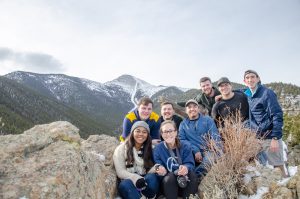
Students hike up to the crosses at the edge of one of the ridges of Mt. Princeton.
by M. C. Jennings | Dec 14, 2018 | Academics, COBA Faculty, COBA Staff, Current Students, Faith Infusion, School of Information Technology and Computing, Uncategorized
It’s graduation day for our December graduates and we wanted to take one more opportunity to celebrate this milestone in their lives. Last week, on December the 4th, COBA hosted a luncheon in their honor celebrating them and all of the hard work that has helped them reach this day. Faculty, staff and students enjoyed fellow-shipping with each other, learning more about students’ favorite experiences at ACU and what advice those that were a little older would give them as they go out into the world.
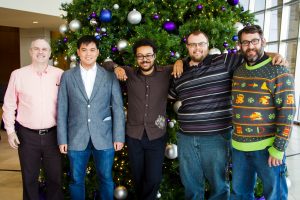
It’s our tradition for a faculty member to give a blessing over the graduates as we say goodbye to them. Dr. David Perkins, Professor of Accounting, did this in an unusual way this year. Known for his guitar ballads in class, he chose to sing the blessing over them with a David Perkins original song.
We hope you’ll enjoy hearing his message to the students as well as seeing some pictures from the event. To the class of 2018 we say thank you for choosing ACU, for investing of yourself in the process, and for making us all better people during your time here. May God bless you and give you 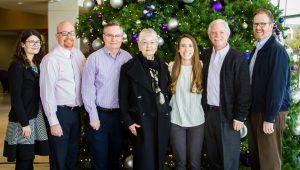 wisdom and direction knowing that He has designed you for His purpose and good works, which he has planned and prepared in advance for you to do.
wisdom and direction knowing that He has designed you for His purpose and good works, which he has planned and prepared in advance for you to do.
To view the video, click here.
To view all of the pictures from the luncheon, click here.
by M. C. Jennings | Oct 2, 2018 | Academics, Accounting, COBA Faculty, Current Students, MAcc, Uncategorized
Our last installment in our COBA Study Abroad series highlights the MAcc (Master in Accountancy) trip to Australia and New Zealand, led by Dr. Curtis Clements and Dr. Kyle Tippens. MAcc students received credit for International Accounting and Financial Reporting and International Financial Markets. We can’t think of a better way to learn about global business than being immersed in it! We asked Dr. Clements to tell us what it’s like to learn in the land down under.
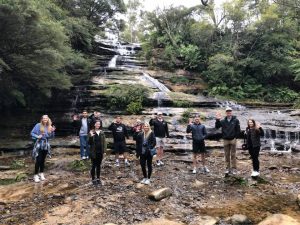
What made your destination a unique place to study?
We didn’t really have a home city. Instead, we traveled to three cities: Sydney and Melbourne in Australia and Auckland in New Zealand. We chose Australia and New Zealand because we had business contacts there and for their diverse cultures.
What businesses were you able to visit?
We visited a number of companies and organizations. These include PWC, KPMG, EY, the Sydney Wool Exchange, The Australian Accounting Standards Board, The Australian Auditing Standards Board, ANZ Bank, Australia-New Zealand Chartered Accountants, and Xerox.

Did you take the students on any sight seeing tours?
In Sydney we went to Taronga Zoo. Taronga is a world-class zoo with many different animals from around the world. We also took a nighttime harbor cruise during the Vivid Sydney festival, which was outstanding. In Melbourne, we took a trip outside the city on a train powered by a steam engine. In New Zealand, we toured Hobbiton where the Lord of the Rings movies were filmed as well as the Hobbit movies. We also went to the Te Puia Maori Village cultural center in Rotorua. On their own, the students also traveled to the Blue Mountains, Manly Beach, and Bondi Beach in Sydney. They attended an Aussie Rules football game, went to Brighton Beach, and watched the penguins come ashore in Melbourne. In New Zealand, the students traveled to several locations outside of Auckland.
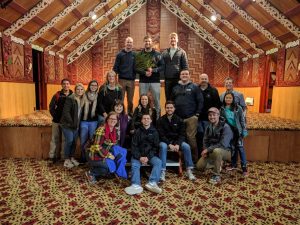
What is it like to be able to spend so much time with students in another country? How does it differ than being in a classroom setting in Abilene?
The experience was outstanding! You get to know the students so well and they get to know you beyond what they see in the classroom. It allows you to speak into their lives on a much deeper level. We learned so much about the students and, hopefully, they know us and our families better.
What were your favorite moments/experiences of the trip?
Two things stood out for me. First, my wife and I were able to renew friendships with people we haven’t seen in 27 years. As far as the academic part of the trip, there are so many things that were enjoyable and informative. I don’t think we had a bad visit and it is really hard to point to one thing. It was interesting as I was reading the students’ journals as they would say, “This is the best thing on the trip!” And then just a day or two later, they would say the same thing! As far as the sightseeing, I would have to say the trip to Hobbiton was the best thing we did.
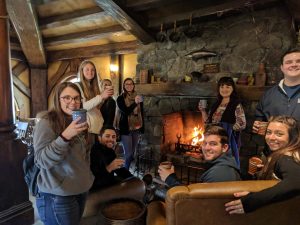
If students could only learn one thing, what do you hope they learned?
That we live in an interconnected world. This is especially true in business. As an aside, I also hope they learned that what we teach and tell them in class really matters!
Anything else I’ve forgotten to mention that you would like to talk about?
We have some outstanding students!
by M. C. Jennings | Sep 14, 2018 | Academics, COBA Faculty, Current Students, Faith Infusion, Social Entrepreneurship, Student Spotlights, Uncategorized
COBA professors and students were world travelers this summer, as we have covered in parts 1 and 2 of our blog series on our study abroad trips. This July, professors Laura and Mark Phillips took students to Central America where they received course credit in MGMT 419 (Global Entrepreneurship) and MGMT 340 (Fundamentals of Life Design). We asked Dr. Laura Phillips to tell us about their experience. We hope you enjoy the third installment of our four part blog series on the 2018 travels of the COBA Study Abroad program.
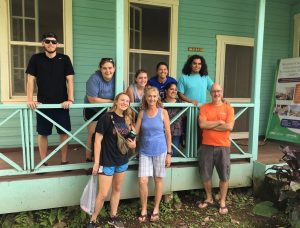
What made Central America a unique place to study?
Central America is a unique place to study Global Entrepreneurship because while the culture, laws, and economic environment are different from the United States, Central America is a place with lots of start-up businesses. Also, the people are very hospitable which makes visiting start-ups easier. In addition, Central America is small geographically but the different countries are unique. Some of the challenges of starting a business in Costa Rica are different from the challenges of starting a business in Honduras. Finally, we were able to see first hand how the government can drastically alter the business environment; the recent unrest in Nicaragua is an unfortunate example of the instability inherent in emerging economies.
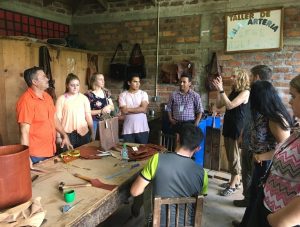
What businesses were you able to visit?
I’m not even sure where to start here. I guess I’ll just make a list.
San Jose, Costa Rica
- Yuxta Energy–solar energy
- e.e.d.–legal services for social ventures
- VivaIdea–a think tank for increasing the impact of entrepreneurship in Latin America
Guanacaste region
- Vida Adventura–adventure camp
- Hotel Las Tortugas–small private hotel in Playa Grande
- Taco Star–taco shop on the beach
Sarapiqui region
- Chilamate Rainforest Eco Retreat
Turrialba region
- CATIE University and the Sustainability House
- butterfly farm
- dairy/cheese making business
- beneficial plants business (medicinal, herbs, etc.)
- pueblo tourism business
Honduras
- Mission Lazarus–here we also
- made organic fertilizer
- conducted a half day training session for the students and teachers at the vocational schools on basic business topics
- hardware store
- bootmaker
- trash collector/recycler
- restaurant owner
- coffee farm/barber shop/tienda owner
For the most part we visited with the entrepreneur (or an employee for the larger organizations) to learn about what they do, what the biggest challenges are, how/if they plan to grow, etc.
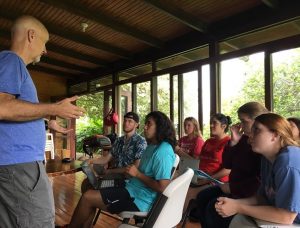
Did you take the students on any sight seeing tours?
- Walking tour of San Jose
- Ziplining at Vida Adventura
- Horseback riding at Vida Adventura
- Surfing lessons at Playa Grande or
- Canoeing on the estuary at Playa Grande
- Birdfinding nature walk
- Hike to waterfall and swimming
- Cultural scavenger hunt (milking cows, Latin dancing, making tortillas, etc.
- Archaeological tour
The students enjoyed the sightseeing activities. They were a lot of fun.
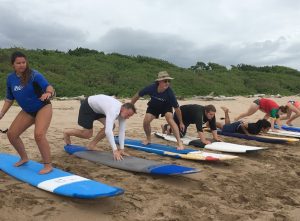
What is it like to be able to spend so much time with students in another country? How does it differ than being in a classroom setting in Abilene?
This particular study abroad is different from going to Oxford or Leipzig because we really are all together most of the time. There were even a couple of places where we stayed in one big house. It’s very different because in Abilene you are with your students in class and then they do their own thing the rest of the time. On this study abroad we usually eat together, we travel together, we spend much of our free time together, plus we have class together. You really get to know each other and, as the students said, you become more like family.
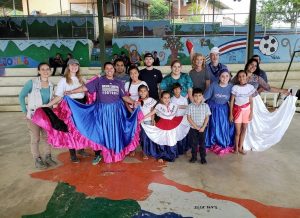
What were your favorite moments/experiences of the trip?
Well, I love the fact that we are outside so much and that even when you are “inside” you are usually outside. In many ways life is harder but in many ways it’s simpler. The pace of life is slower and the people put more emphasis on relationships than on to-do lists. Most of our students found the Latin pace therapeutic. There were many great experiences but one of my favorites was going in the butterfly house. The house was full of flowers and the butterflies seemed like flying flowers. It was beautiful.
I also loved watching our students conduct the business training for the people at Mission Lazarus. That activity was a real challenge and stretch for our students, especially since we were having to work through a translator. They students rose to the challenge and did a fantastic job!
If students could only learn one thing, what do you hope they learned?
I would want our students to learn that people are people everywhere; we are more similar than we are different. I would want them to learn that there are business opportunities everywhere but that to be successful you MUST know the culture and context of the place in which you are operating. I would want them to know that the fast-paced, individualistic, climb to the top American business style is not the only way to live. I would want them to know that being happy and being successful are not directly tied to a salary amount or prestige. (So…that’s four things, but they are kind of related.)
by M. C. Jennings | Aug 20, 2018 | Academics, COBA Faculty, Current Students, Faith Infusion, Uncategorized
This July, the COBA classroom moved around the world to Leipzig, Germany with professors Don Pope and Dennis Marquardt leading the way. Students received course credit in Cross Cultural Organizational Behavior and Global Operations Management. We asked Dr. Pope to tell us an overview of their trip. We hope you enjoy the second installment of our four part blog series on the 2018 travels of the COBA Study Abroad program.
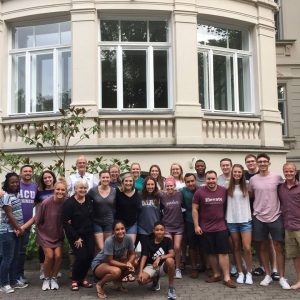
The group poses in front of their home away from home in Leipzig
What made Leipzig a unique place to study?
Leipzig is a mid-sized German city with a long and proud history. It is not a tourist destination. You would have to search for a souvenir shop. It is historically important because it was the home of Bach, among other well known German musicians and writers. Martin Luther lived in the nearby town of Wittenberg. Leipzig was the center of the ‘quiet revolution’ uprising that brought down the iron curtain in 1989. The German language adds a dimension to a study abroad experience that an English-speaking location cannot provide. But, enough English is spoken to allow one to get around without great difficulty.
Were you able to visit any companies or work on projects with companies in other countries?
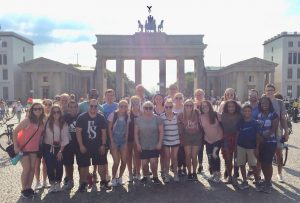
At the Brandenburg Gate in Berlin
We toured the BMW assembly plant in Leipzig which is very modern, is automated, and operated with great German efficiency and attention to sustainability.
Did you take the students on any sight seeing tours?
We took the students to visit Wittenberg where Martin Luther nailed his statement of protest to the church door 501 years ago, at great personal risk to his life. We also did a group tour of Berlin and many of the sites there, including the Berlin wall and memorial museum for Jews who lost their lives in the Holocaust. We traveled to Weimar and the nearby site of the World War II Nazi concentration camp, Buchenwald. We saw a place of great horrors and felt the weight of the suffering that occurred there. We saw the 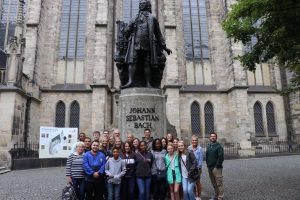 ovens that burned the bodies of those killed, the hooks on the walls where people were hung, the shoes of the victims, many of them children. We saw the memorial to the living – those who survived. The memorial plaque is simple in design, and heated to a living temperature of 98.6 all through the cold winters.
ovens that burned the bodies of those killed, the hooks on the walls where people were hung, the shoes of the victims, many of them children. We saw the memorial to the living – those who survived. The memorial plaque is simple in design, and heated to a living temperature of 98.6 all through the cold winters.
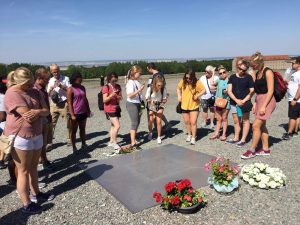
Visiting the Buchenwald Concentration Camp Memorial
What is it like to be able to spend so much time with students in another country? How does it differ than being in a classroom setting in Abilene?
Spending time in other countries helps to open your mind, eyes and heart to the world and appreciate the lesson that God tried to each Jonah long ago – that He loves and cares for all people everywhere.
What were your favorite moments/experiences of the trip? 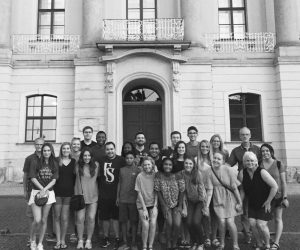
The trips mentioned above, and getting to hang out with the students and get to know them better.
If students could only learn one thing, what do you hope they learned?
That the world is a much bigger place than the little bubble that most of us live in, and that we need to learn to live and function in a global community.
by M. C. Jennings | Aug 14, 2018 | Academics, COBA Faculty, Current Students, Uncategorized
This summer, COBA students and professors traveled the globe learning more about how globally connected we are through business and about the people and cultures on the other side of the world. This is the first of a three part blog series on the 2018 travels of the COBA Study Abroad program. We hope you enjoy living vicariously through these stories as much as we have!
In June, professors Sarah Easter and Mark Phillips led a group of students to Oxford, England offering course credit in International Business and Professional Development and Life Design. We asked Dr. Easter and Dr. Phillips a few questions to learn more about this fantastic experience and why other students should sign up to go in the future.

What made Oxford a unique place to study?
Oxford is a beautiful city, rich with stunning architecture, history and culture. As the home to Oxford University and its many colleges, there are lots of different university buildings, churches and museums to visit as well as numerous green spaces and parks. Plus, it’s very walkable and a short train ride to London and beyond.
Were you able to visit any companies or work on projects with companies in other countries?
In the Oxford area, we took a tour of the MINI Cooper plant and Oxfam International, a leading UK-based charity, to learn about their international operations. We also took a day trip to London to learn about Sodexo’s corporate social responsibility initiatives as a global catering service provider; experience Siemen’s The Crystal, one of the world’s most sustainable buildings; and have lunch with an alum based in London to learn about her experiences living and working abroad.
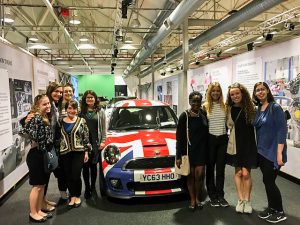
Our highlight excursion was a four-day trip to Slovenia where we met with the director for environmental protection for the city of Ljubjlana. She shared the city’s many initiatives focused on environmental sustainability including making the main city center largely car free; Ljubljana won the Green City Capital award for 2016 from the European Commission. We also met with professors at the University of Maribor to learn about the Slovenian economy, and with a leader for a faith-based organization focused on youth outreach in Slovenia to learn about enacting faith in a largely secular culture. It was a fantastic trip in a beautiful and friendly country!
Did you take the students on any sight seeing tours? 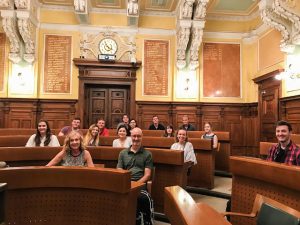
We wanted students to experience local culture in Oxford as much as possible during our short time there. So, we incorporated some local activities into our agenda, including punting on the River Cherwell (http://cherwellboathouse.co.uk/punting/) and going to an evensong service (a choral-based church service) at Christ Church. While in Slovenia, we took a city walking tour of the capital, Ljubjlana, as well as a day trip to the popular Lake Bled to experience the emerald blue lake and visit the Bled castle.
What is it like to be able to spend so much time with students in another country? How does it differ than being in a classroom setting in Abilene?
We really enjoyed getting to know the students in a much more personal manner than is typically possible in a classroom setting in Abilene. Not only did we interact with students in the classroom on a daily basis, but we also had the opportunity to live with and hang out with students as well. The Phillips had the students over to their apartment in smaller groups for dinner and I (Sarah) organized dessert outings around Oxford with them, which really contributed to us building relationships with them in a more relaxed (and hopefully fun) format.
What were your favorite moments/experiences of the trip?
Sarah: There are too many to name but a few of my favorite experiences include: getting to know the students via yummy dessert outings around Oxford; going punting as a group on the River Cherwell; and our excursion trip to Slovenia.
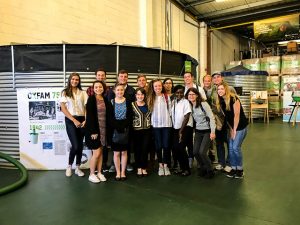
Mark: Working with our students on their Life Design plans. They have so many opportunities and it was wonderful to watch as they wrestle with their options.
If students could only learn one thing from this experience, what do you hope that would be?
Sarah: My hope for students is that studying abroad will instill a true appreciation for other national cultures (and how complex and varied they are) as well as to spark a desire to seek and serve others throughout the world – wherever God calls them to be in the future.
Mark: Texas and even the United States make up a tiny fraction of the world. As much as we love it here, I hope they began to get a glimmer of the amazing possibilities out there.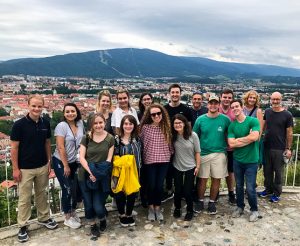
We would strongly encourage students even thinking about study abroad to apply (there are scholarship opportunities available!). It is truly a life changing experience that will not only provide students with much more of a global mindset that today’s employers are looking for, but it will also affect them personally and provide them with a more well-rounded view of the world in which they live.
Students can learn about upcoming trips for the summer of 2019 at fall study abroad interest meetings. Check your COBA newsletter for dates!







 wisdom and direction knowing that He has designed you for His purpose and good works, which he has planned and prepared in advance for you to do.
wisdom and direction knowing that He has designed you for His purpose and good works, which he has planned and prepared in advance for you to do.










 ovens that burned the bodies of those killed, the hooks on the walls where people were hung, the shoes of the victims, many of them children. We saw the memorial to the living – those who survived. The memorial plaque is simple in design, and heated to a living temperature of 98.6 all through the cold winters.
ovens that burned the bodies of those killed, the hooks on the walls where people were hung, the shoes of the victims, many of them children. We saw the memorial to the living – those who survived. The memorial plaque is simple in design, and heated to a living temperature of 98.6 all through the cold winters.





